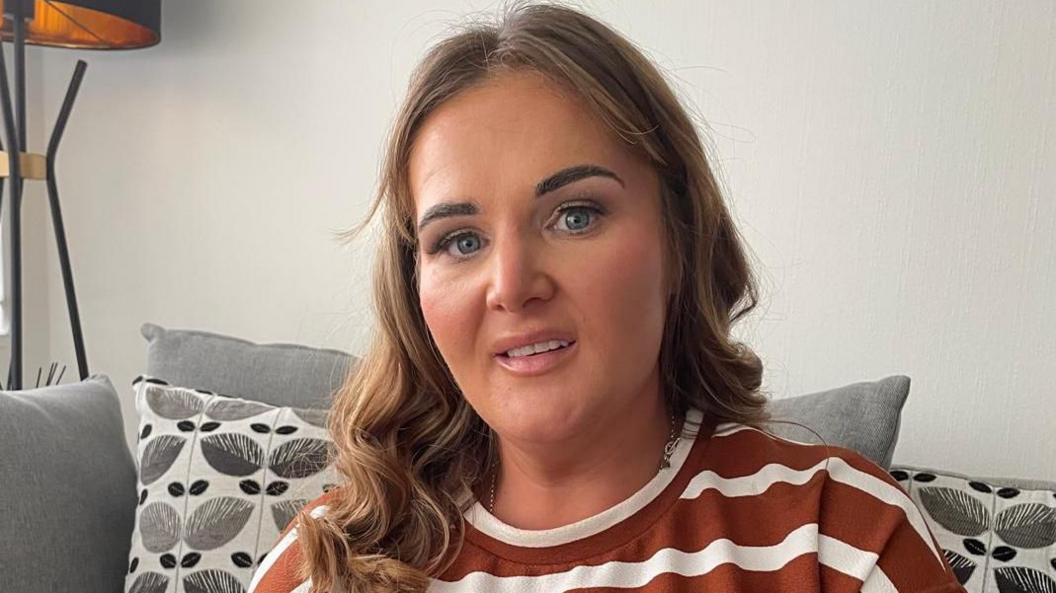A life sentence for us, it should be for him, says trafficking victim

Rebecca Whyte said: "It's a life sentence for us regardless and personally I think it should be for him."
- Published
One victim of a man convicted of human trafficking has said his sentence is not long enough despite it being increased by two years.
Oliver James MacCormack, 72, was given a seven-year sentence in April, with half to be spent in jail and half on licence. He had already spent almost three years in jail and had been set for release on licence by November.
Rebecca Whyte said: "It's a life sentence for us regardless and personally I think it should be for him."
On Tuesday, senior judges held that the original term handed to MacCormack was "unduly lenient".
MacCormack will now serve nine years after being convicted on 40 counts over dates spanning seven years from 2015 to 2022.
The charges included multiple counts of human trafficking, supplying Class A drugs, controlling prostitution for gain, intimidation and perverting the course of justice.
'Drugs helped me cope'
Rebecca Whyte said she met MacCormack while in a relationship with a "drug dealer".
She said that it was through him and another girl that she was introduced to the now 72-year-old.
"I will never forget the first time getting in his car, I can smell it sitting here. He made it very clear what he liked and didn't like and that's how he wormed himself in."
Within weeks Ms Whyte, who had "never touched drugs" before, was "absolutely hooked on heroin" and "lost everything".
Ms Whyte said MacCormack used this as a tool to control her.
She said she felt like she did not fit in anywhere, but when she was with MacCormack sexually, he made her feel that using the "one thing" she had was a "show of love but in the wrong ways".
"The drugs helped me cope, you had to completely zone out," she said.
She described MacCormack as "your typical next door neighbour".
"If you didn't have sex with him and the other men – you weren't getting your hit and it wasn't a hit to get off your head, it's to function.
"If we didn't do what he wanted our life wasn't worth living," Ms Whyte added.
She said that he "wormed his way around my family" and he found out "where you lived".
"He is calculative, manipulative, he is a very smart man. He knows exactly what he is doing," she said.
'He is a predator'
Ms Whyte said "age shouldn't come into this" when talking about his sentence.
"He is a predator, a paedophile as well. He instilled so much fear in us. I haven't just been left with mental scars, I have physical scars.
"I have problems as a woman now. That's a hard pill to swallow," she added.
Ms Whyte said MacCormack took everything from her and left her feeling lost.
"It's a life sentence for us regardless and personally I think it should be for him. But unfortunately our justice system doesn't work like that."

MacCormack was originally given a seven-year sentence in April
In court, Lady Chief Justice Dame Siobhan Keegan said: "He portrayed himself as some sort of saviour, rather than a calculated abuser of vulnerable young women."
There were nine victims across the Greater Belfast area, some were 17 years-old when the offences were committed.
The court heard how MacCormack, from the Lisburn area, targeted victims by supplying them with illegal drugs, making them dependent on him.
The court also heard MacCormack "ingratiated" himself into the victim's lives and groomed them into sex work and prostitution.
He was one of four men, who all preyed on vulnerable women who were addicted to drugs.
Kenneth David Harvey, aged 74; Derek Brown, aged 71; and 77-year-old Robert Albert Rogers - were previously sentenced, with Harvey and Brown jailed.
'Most serious case in NI to date'
The Public Prosecution Service (PPS) challenged MacCormack's original sentence, claiming it failed to fully reflect the high culpability, aggravating features and need for deterrence.
Charles MacCreanor KC, barrister for the PPS, argued that MacCormack manipulated and exploited young women.
He told the court: "Ultimately he used them like commodities to be sold in order to be of financial benefit.
"It was the most serious case seen in Northern Ireland to date."
Three appeal judges, who backed the PPS case, formally declared the sentence was "unduly lenient".
"This was a case involving a suite of offending against vulnerable women which requires appropriate punishment to deter this type of behaviour in our community and to soundly rebut the attitude of the defendant. Such attitudes have no place in our society," the Lady Chief Justice stated.
She confirmed the sentence will be nine years, "split equally between custody and licence".
Related topics
- Published10 April

